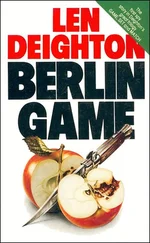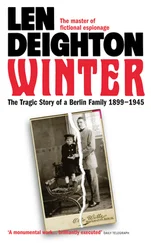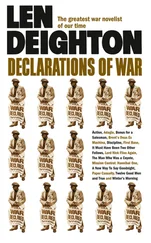Len Deighton - XPD
Здесь есть возможность читать онлайн «Len Deighton - XPD» — ознакомительный отрывок электронной книги совершенно бесплатно, а после прочтения отрывка купить полную версию. В некоторых случаях можно слушать аудио, скачать через торрент в формате fb2 и присутствует краткое содержание. Жанр: Триллер, на английском языке. Описание произведения, (предисловие) а так же отзывы посетителей доступны на портале библиотеки ЛибКат.
- Название:XPD
- Автор:
- Жанр:
- Год:неизвестен
- ISBN:нет данных
- Рейтинг книги:4 / 5. Голосов: 1
-
Избранное:Добавить в избранное
- Отзывы:
-
Ваша оценка:
- 80
- 1
- 2
- 3
- 4
- 5
XPD: краткое содержание, описание и аннотация
Предлагаем к чтению аннотацию, описание, краткое содержание или предисловие (зависит от того, что написал сам автор книги «XPD»). Если вы не нашли необходимую информацию о книге — напишите в комментариях, мы постараемся отыскать её.
XPD — читать онлайн ознакомительный отрывок
Ниже представлен текст книги, разбитый по страницам. Система сохранения места последней прочитанной страницы, позволяет с удобством читать онлайн бесплатно книгу «XPD», без необходимости каждый раз заново искать на чём Вы остановились. Поставьте закладку, и сможете в любой момент перейти на страницу, на которой закончили чтение.
Интервал:
Закладка:
‘You’re too hard on him, Boyd.’
‘He’s a Byzantine bastard,’ said Stuart without animosity.
‘Not at all. He is unmistakably Gothic.’
Stuart grinned. She was absolutely right. There was nothing of the devious oriental cunning that characterized so many of the senior staff of the department. The DG was a man of brutal bluffness, and even his appearance was more like the rough weathered stone of northern Europe than the smooth silks of the schism. ‘Don’t go.’
‘I must. Is your car here?’ she asked.
‘Yes.’
‘Will you be finished in time for dinner?’
‘There’s a very good new restaurant in Sloane Street.’
‘Just as long as it’s not curry.’ She leaned over and kissed him on the forehead. For five minutes or more he sat there thinking about her, then he went back to work. He still needed ‘hard reference’ to the man in the film. Someone would be working all night on that one.
23
The following morning, Tuesday, July 17, while Boyd Stuart and Kitty King were having breakfast together in his comfortable London apartment, the man whose face he had been seeking in the old Third Reich newsreels was breakfasting in a tall building in Hamburg. His name was Willi Kleiber and the breakfast was a business meeting at which eight senior business executives met together under the chairmanship of Dr Böttger. These were the trustees of the fund collected for the needs of Operation Siegfried, and the meeting was held in the private dining room of one of the banks which Böttger controlled.
Willi Kleiber sat on Dr Böttger’s immediate right. It was an appropriate seat for the man who had given so much of his time to the initial planning of Operation Siegfried, who not only had worked hard at the scheme but had actually introduced the idea into Dr Böttger’s head. Had Boyd Stuart seen the hatchet face of Willi Kleiber he would have called him Reichsbank Director Frank. And had Colonel Pitman’s cashier seen him before he shaved off the blunt moustache he had grown over Christmas 1978 he would have called him Peter Friedman, the beau parleur whose letters of credit secured him the millions that had crippled the bank.
It was early and Hamburg was enjoying clear blue skies. From this glass-sided conference room, high above the city, there was a view of St Michael’s Church and the Bismarck Memorial, and the sun and the morning breeze were making the dark water of the Elbe shimmer like hammered copper.
Kleiber liked Hamburg. He liked its ever-changing weather, its bars and its restaurants, the smell of the sea and the fine clear German that its inhabitants spoke. His brief, and never to be repeated, attempt at marriage had taken place in this town. That would have blighted the location for some men, but Kleiber was able to accept the pleasures of past experiences without dwelling upon the miseries; he felt the same way about his time in the war. He seldom came here without seeing his ex-wife. She was still attractive and amusing, and always wanted to hear about Willi Kleiber’s latest sexual conquests. It was as if she got some perverse and vicarious enjoyment from these detailed descriptions of his lechery. More than once he fantasized about taking her back to his hotel room, undressing her and… But Willi Kleiber knew that that would never happen. Not because his ex-wife would not enjoy it-but because her new husband was a senior official with the BND. A man who went frequently to London for conferences with senior British intelligence officials was a contact too valuable to risk for the sake of an afternoon of grab-ass. Tomorrow he would be having lunch with both husband and wife. It was safer that way.
‘Things have not gone quite as smoothly as we’d hoped,’ admitted Dr Böttger. He was a scholarly-looking man, sixty years old, slightly plump, with silver hair and gold wire spectacles. His face was becoming flushed, Kleiber noticed. It was a sign of anxiety, like the way in which Böttger thrust his fist into the jacket of his expensive suit with enough force to break the stitching. ‘But the plan goes forward. When we took so much money from their bank in Geneva we expected them to offer these documents to us through Herr Kleiber’s man in Los Angeles. That proved to be a miscalculation on our part.’ Böttger twisted his head far enough to see whether Willi Kleiber showed some appreciation; actually it had been Kleiber’s miscalculation. Kleiber nodded with an almost imperceptible movement, but Böttger had become accustomed to such signals in the boardroom. ‘It was the sensible, logical thing to do,’ he continued. ‘Perhaps if these men had been Germans they would have reacted rationally… but they are Americans… ’ Böttger smiled, hoping to draw a response from his colleagues but only Kleiber acknowledged the jest.
Dr Böttger pressed his lips with his finger-tips. ‘All of us have given a great part of our lives to making Germany prosperous, strong and a good place to live,’ said Böttger. ‘Has anyone forgotten what we suffered under Hitler and his fellow criminals? Do I have to tell you what the Nazis did to our country and to our people; not just the physical destruction that came from the war, but the moral damage that the Nazi propaganda did to our children. Are you unaware of what our compatriots in the east suffer under a regime of Moscow-trained puppets? We live in the west, and we count our blessings; but German democracy is a delicate flower, transplanted from other climes. What we have built from the ashes of 1945 could be quickly destroyed by neo-Nazi madmen or by communist lunatics who would like to see Russian soldiers patrolling our streets.’
‘You’re right, Dr Böttger,’ said a voice from the far end of the table.
‘Hitler is dead,’ said Böttger. ‘Let him remain dead. We want no revelations, no so-called Hitler Minutes, no secret plans to bring Hitler out of the grave and adorn him with the glories of newsworthy historical triumphs. Make no mistake, there are men who would snatch political power from such apotheosis.’ He stroked his face. ‘What do the British care about Churchill’s reputation; they have history books full of such men. Democracy is the fabric from which their society is woven. It is our frail newly created democracy which needs the reputations of Churchill and Roosevelt and other such leaders who have proved that a man can be warm, well-fed and happy, as well as being free to say what he likes and to vote his masters out of office. That’s why we must go to any lengths to make sure that Moscow doesn’t get these documents. Neither must they fall into the hands of the muck-raking journalists who think only of their careers. Nor of those men who’d tell us that Hitler was a twentieth-century Bismarck.’ He looked round at them. ‘Don’t weaken now, my dear friends, don’t weaken now.’
Dr Böttger sat down. There was no reaction to his speech except that each of the men now turned his attention to the German-style breakfast that had been set upon individual embroidered cloths around the long polished table.
Böttger fastidiously took a knife and cut the top from his boiled egg. The others followed his example. The formalities were finished. Now came the questions. Dr Böttger hated questions.
‘It is the violence that troubles me,’ admitted a frail, freckled man at the other end of the table. His name was Fritz Rau. ‘Several men have already been killed, you tell us. Can we be sure that that is the end of it?’ He was forbidden to eat eggs, butter or cheese, and now he nibbled carefully upon the black bread.
Böttger seized the nettle. ‘By no means. I have no doubt that there will be other deaths, simply because the men we are up against are determined upon a collision course.’
Читать дальшеИнтервал:
Закладка:
Похожие книги на «XPD»
Представляем Вашему вниманию похожие книги на «XPD» списком для выбора. Мы отобрали схожую по названию и смыслу литературу в надежде предоставить читателям больше вариантов отыскать новые, интересные, ещё непрочитанные произведения.
Обсуждение, отзывы о книге «XPD» и просто собственные мнения читателей. Оставьте ваши комментарии, напишите, что Вы думаете о произведении, его смысле или главных героях. Укажите что конкретно понравилось, а что нет, и почему Вы так считаете.












